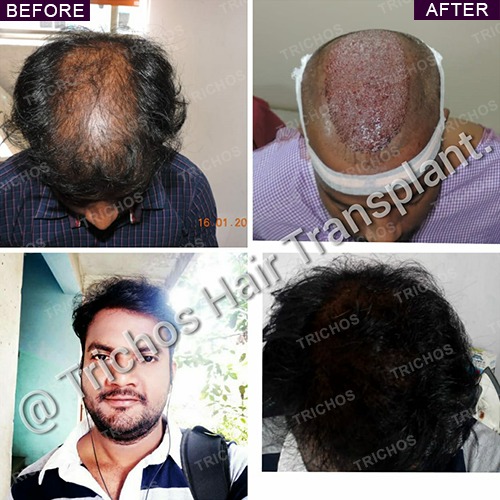Can You Apply Minoxidil for moustache?
Different questions are being raised by fans and followers of Dr John Watts on his series of hugely popular educational videos related to hair transplant and hair growth issues.
In this educational video, noted dermatologist & trichologist and one of the Best Hair Transplant Surgeons in Hyderabad Dr John Watts answers six important Frequently Asked Questions (FAQs) raised by his followers.
Phani Prabha asks: “My hair is turning greasy after one day of taking a head bath. What should I do?”
In his response, Dr John Watts – one of the best hair transplant surgeons in India – tells Phani Prabha that it could be a case of severe dermatitis.
“Possibly, this could be because one’s dandruff problem is at an advanced stage,” reasons Dr John Watts.
While advising possible solutions, Dr John Watts informs the patient to desist from applying oil to the scalp as little as possible. “You can do two things: Take a head bath every day and try to avoid applying hair oil. Better to apply it only once in a week,” he suggests.
Rohit Vemula asks: “Can I apply Minoxidil for moustache hair growth?”
This is a tricky area as Dr John Watts explains that generally Minoxidil can be applied without any inhibition for beard and scalp hair growth but to use it for moustache could be a grey area of concern.
“Use of the alcohol-based product may directly get into the nasal mucosa in the nasal cavity, which could backfire,” says Dr John Watts, while suggesting that the patient consult a qualified dermatologist or trichologist to find out why he has moustache hair growth issue.
Ramachandra N asks: “What is the best time to take Finasteride? Morning or nighttime? My doctor told me to take it on alternate days. Please suggest.
There is a small section of patients who might experience some side effects after taking Finasteride drug for hair growth. This happens mostly concerning sexual function.
Dr John Watts suggests that there is a better way to take Finasteride drug to minimise this side effect.
“For best results with Finasteride, it is better if one takes the drug every day. To avoid its side effect, I usually suggest to my patients that they take it in the morning. This minimises the side effect chances,” informs Dr John Watts.
While explaining the rationale, he tells the patient that Finasteride usually has a half-life period of six hours. “Hence, if one engages in sexual activity after this period, there is minimal chance of side effect of this drug,” he informs.
He further informs that it is better to confine the use of this drug only during Mondays-Fridays while keeping the weekend days as “drug holidays” so that one’s weekend time is not affected in any way.
However, he tells the patient to follow his doctor's advice as there might be some logic why alternate day use was prescribed for him.
Ajay Royal Star asks: “If I stop using Minoxidil will my hair growth stop again?
Responding to him, Dr John Watts tell the patient that Minoxidil is used for the promotion of the hair cycle that leads to hair growth.
However, it has some limitations as once one stops taking the drug, the hair growth cycle may come to a halt again.
“The halting of Minoxidil drug can trigger and reactivate the DHT and one may come back to square one as the hair growth may again disappear in 2-3 months,” says Dr John Watts, adding that the hair loss may be faster if one has a family history of baldness.
Ramachandra asks: “After a hair transplant, can I use saltwater for a head bath?
While answering this question, Dr John Watts straightway suggests that it is better to avoid taking a head bath with salt or hard water during 5-10 days after a hair transplant. “Saltwater can adversely affect the hair. After a few days of hair transplant, generally, the transplanted hair falls,” he answers.
If one has no choice but to use only saltwater, he suggests that one heats the saltwater first and avoid using the bottom part of the water for a head bath.
Trichos provides state-of-the-art treatment for various hair loss conditions. Please reach us for any query.
Book an appointment for expert guidance


About
Causes
Alopecia
Restoration
Procedures
Locations
Disclaimer: While hair transplants are generally safe and effective, as with any medical procedure, there can be minimal and temporary side effects based on specific or underlying medical condition of the individual patient. Please consult in person with our qualified medical team at Trichos for a thorough assessment of your specific condition and individualized guidance on the potential risks and benefits associated with our hair restoration treatments.
Learn more about Medical Consent for Surgeries.



